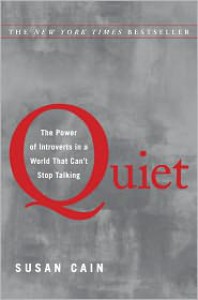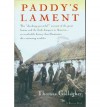Currently reading
Paddy's Lament, Ireland 1846-1847: Prelude to Hatred
Pivot: The Only Move That Matters Is Your Next One
When in French: Love in a Second Language
Beyond the Job Description: How Managers and Employees Can Navigate the True Demands of the Job
Vision and Art: The Biology of Seeing
Achieving Your Potential As A Photographer: A Creative Companion and Workbook
Reclaiming Conversation: The Power of Talk in a Digital Age
Picture Perfect Practice: A Self-Training Guide to Mastering the Challenges of Taking World-Class Photographs (Voices That Matter)
Man's Search for Meaning
Terms of Service: Social Media and the Price of Constant Connection
Quiet: The Power of Introverts in a World That Can't Stop Talking
 While reading this book this week, I've been putting a new lens on all kinds of observations -- was Darcy in P &P, a misunderstood introvert, etc.? Certainly brings some balance to the general cultural stereotype of introverts. A little uneven in its writing at times, but overall, well worth reading and thinking about. I wonder how many extroverts will be attracted to it though? Snippets:-- "The bus to Abilene" -- a family goes to Abilene because of an idle suggestion. No one really wants to go, but no one suggests anything else. "reveals our tendency to follow those initiate action -- any action. p.52Introverted managers work best with proactive employees. "Grant says it makes sense that introverts are uniquely good at leading initiative-takers. Because of their inclination to listen to other and lack of interest in dominating social situation, introverts are more likely to hear and implement suggestions. Having benefited from the talents of their followers, they are then likely to motivate them to be even more proactive. Introverted leaders create a virtuous circle of proactivity." p.57"Open-plan offices have been found to reduce productivity and impair memory. They're associated with high staff turnover. They make people sick, hostile, unmotivated and insecure. ..." p. 84 She cites several studies in the footnotes. "highly sensitive people" "tend to be philosophical or spiritual in their orientation, rather than materialistic or hedonistic. They dislike small talk. They often describe themselves as creative or intuitive. They dream vividly, and can often recall their dreams the next day. They love music, nature, art, physical beauty. They feel exceptionally strong emotions -- sometimes acute bouts of joy, but also sorrow, melancholy, and fear. HSP also process information about their environments -- both physical and emotional -- unusually deeply. They tend to notice subtleties that others miss -- another person's shift in modd, say, or a lightbulb burning a touch too brightly....The other thing Aron found about sensitive people is that sometime they're highly empathic. It's as if they have thinner boundaries separating them from other people's emotions and from the tragedies and cruelties of the world. They tend to have unusually strong consciences. They avoid violent movies and TV shows; they're acutely aware of the consequences of a lapse in their own behavior. In social settings they often focus on subjects like personal problems, which others consider "too heavy." p.136-137Small talk: :"It's not that there's no small talk, observes Strickland, the leader of the gathering. It's that it comes not at the beginning of conversations but at the end. In most settings, people use small talk as a way of relaxing into a new relationship, and only once they are comfortable do they connect more seriously. Sensitive people seem to do the reverse. They "enjoy small talk only after they've gone deep," says Strickland. "When sensitive people are in environments that nurture their authenticity, they laugh and chitchat just as much as anyone else." p.152Rewards sensitivity and extroversion. "Just as the amygdala of a highly-reactive person is more sensitive than average to novelty, so do extroverts seem to be more susceptible than introverts to the reward-seeking cravings of the old brain." p.159The point is that we tend to overvalue buzz and discount the risks of reward-sensitivity: we need to find a balance between action and reflection. p. 169-1703 key steps to identifying your own core personal projects.1) What did you love to do when you were a child? What was the underlying impulse? 2) Pay attention to the work you gravitate to. 3) Pay attention to what you envy. p.218By spending time on core projects, you can feel more comfortable extending yourself in "extroverted" ways. "Restorative niche" the place you go when you want to return to your true self. Can be physical or temporal (taking a break) "We would all be better off if, before accepting a new job, we evaluated the presence or absence of restorative niches as carefully as we consider the family leave policy or health insurance plans. Introverts should ask themselves: Will this job allow me to spend time on in-character activities? Will I have a private workspace or be subject to the constant demands of an open office plan? if the job doesn't give me enough restorative niches, will I have enough free time on evenings and weekends to grant them to myself? p.219-220Competition/cooperation and intro/extroversionIntroverts like people they meet in friendly contexts; extroverts prefer those they compete with. p.231Venting anger does not dissipate it. "Scores of studies have shown that venting doesn't soothe anger; it fuels it." p. 233
While reading this book this week, I've been putting a new lens on all kinds of observations -- was Darcy in P &P, a misunderstood introvert, etc.? Certainly brings some balance to the general cultural stereotype of introverts. A little uneven in its writing at times, but overall, well worth reading and thinking about. I wonder how many extroverts will be attracted to it though? Snippets:-- "The bus to Abilene" -- a family goes to Abilene because of an idle suggestion. No one really wants to go, but no one suggests anything else. "reveals our tendency to follow those initiate action -- any action. p.52Introverted managers work best with proactive employees. "Grant says it makes sense that introverts are uniquely good at leading initiative-takers. Because of their inclination to listen to other and lack of interest in dominating social situation, introverts are more likely to hear and implement suggestions. Having benefited from the talents of their followers, they are then likely to motivate them to be even more proactive. Introverted leaders create a virtuous circle of proactivity." p.57"Open-plan offices have been found to reduce productivity and impair memory. They're associated with high staff turnover. They make people sick, hostile, unmotivated and insecure. ..." p. 84 She cites several studies in the footnotes. "highly sensitive people" "tend to be philosophical or spiritual in their orientation, rather than materialistic or hedonistic. They dislike small talk. They often describe themselves as creative or intuitive. They dream vividly, and can often recall their dreams the next day. They love music, nature, art, physical beauty. They feel exceptionally strong emotions -- sometimes acute bouts of joy, but also sorrow, melancholy, and fear. HSP also process information about their environments -- both physical and emotional -- unusually deeply. They tend to notice subtleties that others miss -- another person's shift in modd, say, or a lightbulb burning a touch too brightly....The other thing Aron found about sensitive people is that sometime they're highly empathic. It's as if they have thinner boundaries separating them from other people's emotions and from the tragedies and cruelties of the world. They tend to have unusually strong consciences. They avoid violent movies and TV shows; they're acutely aware of the consequences of a lapse in their own behavior. In social settings they often focus on subjects like personal problems, which others consider "too heavy." p.136-137Small talk: :"It's not that there's no small talk, observes Strickland, the leader of the gathering. It's that it comes not at the beginning of conversations but at the end. In most settings, people use small talk as a way of relaxing into a new relationship, and only once they are comfortable do they connect more seriously. Sensitive people seem to do the reverse. They "enjoy small talk only after they've gone deep," says Strickland. "When sensitive people are in environments that nurture their authenticity, they laugh and chitchat just as much as anyone else." p.152Rewards sensitivity and extroversion. "Just as the amygdala of a highly-reactive person is more sensitive than average to novelty, so do extroverts seem to be more susceptible than introverts to the reward-seeking cravings of the old brain." p.159The point is that we tend to overvalue buzz and discount the risks of reward-sensitivity: we need to find a balance between action and reflection. p. 169-1703 key steps to identifying your own core personal projects.1) What did you love to do when you were a child? What was the underlying impulse? 2) Pay attention to the work you gravitate to. 3) Pay attention to what you envy. p.218By spending time on core projects, you can feel more comfortable extending yourself in "extroverted" ways. "Restorative niche" the place you go when you want to return to your true self. Can be physical or temporal (taking a break) "We would all be better off if, before accepting a new job, we evaluated the presence or absence of restorative niches as carefully as we consider the family leave policy or health insurance plans. Introverts should ask themselves: Will this job allow me to spend time on in-character activities? Will I have a private workspace or be subject to the constant demands of an open office plan? if the job doesn't give me enough restorative niches, will I have enough free time on evenings and weekends to grant them to myself? p.219-220Competition/cooperation and intro/extroversionIntroverts like people they meet in friendly contexts; extroverts prefer those they compete with. p.231Venting anger does not dissipate it. "Scores of studies have shown that venting doesn't soothe anger; it fuels it." p. 233













